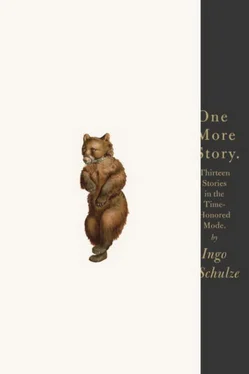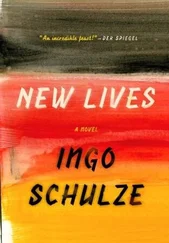“I tried,” Pavel said, “to work my way forward to him—”
“I didn’t think that was such a good idea,” Ines interrupted. “And Peter, maybe because he saw Pavel coming in his rearview mirror, went into such a tight curve that I was sure Pavel would be thrown overboard.”
“I just bumped my head.”
“‘Just’ is good,” Susanne said.
“Yes, ‘just’ is good, because it could have turned out a lot worse,” Ines said. “So we hunkered down, with the Croatian flag behind us — and then suddenly it was over. At first I thought the motor had quit or we were out of gas, but Peter had just pulled the throttle back and was chugging along now in wide curves. I yelled at him, and Pavel yelled at him. I couldn’t think of anything better to say than ‘We want to live! We want to live!’ I don’t know how many times I shouted it. Peter just waved me off in disdain, real disdain, and snapped his thumb and middle finger and roared, ‘It’s like nothing, like nothing!’”
“No, ‘Life is nothing,’ is what he said. ‘Life is nothing!’” Pavel corrected her.
“He said, ‘It’s like nothing,’ and said it with a snap of his fingers.”
“Yes, he snapped them, but he said, ‘Life is nothing,’ because otherwise it might have meant his speeding was like nothing at all.”
“Who the hell cares?” Boris said. “At any rate he was a nut case. You should have demanded your money back, whether it was ‘like’ or ‘life.’”
“It was so unreal,” Ines said. “First the kamikaze bit, and then nothing, as if it was all in our heads. We putt-putted home, it took an eternity. From the water there’s nothing special about Zadar, not like Greifswald or Stralsund. At first I thought it was Anja waiting at the dock, at least there was someone there with a white helmet and a red motor scooter. But once she saw us, she was off in a cloud of dust. Well okay, and then came the moment that had me scared shitless — saying good-bye to Peter. I wanted to give him a piece of my mind. By now I was embarrassed at screaming, ‘We want to live!’ I wanted to tell him how outrageous it was to put people in that situation. Except I didn’t know how to say it in English. Pavel can never get his mouth pried open for stuff like that, it’s always up to me. We tied up, Peter jumped ashore, we groped our way forward. Peter was standing with one foot in the boat, the other on the dock, he held out his hand to me. I grabbed it, and I looked at him, directly into his bad eye — a ghastly dead eye, not even a glass eye, just a socket. I could smell the alcohol on him. Bracing me under my elbow, Peter pulled me up, and I jumped ashore.”
“That eye shocked me too—” Pavel said.
“We stood there like pillars of salt, watching as Peter cast off the line, jumped back in the boat, and started the engine. He waved at us and called out, ‘Ciao, ciao.’ He had put his sunglasses on again. But the most remarkable thing about the whole story is that somehow it came as a relief, I mean his eye—”
Boris burst into laughter.
“Not the way you think — sure, when I consider how he had no depth perception and was speeding like a bat out of hell, but I mean it was good that we at least had that eye, that there was something visibly wrong, some hint. Maybe it sounds perverse, but when I saw that sewn-up eye socket, I calmed down — it was a kind of explanation even if I haven’t a clue what was up with that eye — it could have been an accident, didn’t have to have anything to do with the war.”
“Wait a sec,” Pavel said. “The way you tell it, nobody’s going to understand it. Zadar was under siege for two years, bombarded, for two years. The Yugoslav army left its barracks and headed for the mountains, and then fired down at the town from up there — at everything, houses, churches, libraries, everything. And the people in town, they had nothing, at least to begin with, but nobody talks about that, or almost nobody. Roman told about running with his little brother on his back and not knowing if they would make it or not. And when he got home, his mother was washing windows. She had forbidden him to fight, even though she’d been on the front herself, as a doctor. And when he said that he didn’t want to have anything to do with this war, that he knew of no earthly reason why he should fight, she threw him out of the house. Even though she’d forbidden him to fight, understand?”
“And Anja?” Lore asked. “Was she still together with this Peter guy?”
“In some way, yes. At least she spoke of him as her husband. But she never spent the night with him. She came at eleven and then headed off somewhere.”
“How could you live with someone like that?” Susanne said.
“And what if someone said that about you?” Fred asked. Susanne leaned back and pretended that Fred had addressed his question to everybody.
“Sometimes you can’t help it,” Fred said. “Just as maybe your Peter couldn’t help it. Something happened to me once, nothing to do with war, of course, but it can happen so quickly — you tell a stupid joke, lose self-control, do something raunchy, that’s all it takes.” Fred paused as if he wasn’t sure whether to go on or not.
“We’d met at dance classes, in Dresden,” he then began. “I was seventeen, she was sixteen. Her parents liked me and even invited me to come along on outings with them; they had a car. In the late sixties that was still something special. But for her sake — her name was Ines too — I found excuses not to. I really loved Ines, and I think she loved me too. We hadn’t slept together yet. I always thought that was the last step, the one thing still lacking for us to be truly intimate with each other.”
Fred sat bent forward, letting his head hang and kneading his hands.
“It was the end of August, just before the school year started up again, and she was back from the Baltic with her parents. She had a great tan, and her hair was almost blond. She had written me several postcards, but brought them all back with her. Next year, she said, we would take off together, just her and me. I was happy, but I needed a little while to get used to Ines again, although I’d thought about her the entire time. When I told Ines that my parents would be gone for the weekend, she said she wanted to stay with me. And so Ines came over, and I suggested we ride our bikes out toward Moritzburg, past the harvested fields to the woodland ponds. Directly opposite the nudist camp was a small meadow with access to the lower pond. We were the only ones there. We undressed and went swimming. We didn’t stay in the water long, but when we came out we found four men sitting on the spot where we had laid our clothes — all of them in their late twenties, certainly not rowdy teenagers. Ines stayed in the water, and I got out. But they wouldn’t give me my clothes, they said my little Ines had to fetch them for me. They spoke very softly, almost as if they were friends of mine. They had removed our IDs and called me Friedrich the whole time. I didn’t know what we should do. Ines came out of the water then, and they made comments and cracked dirty jokes at every step she took, every gesture, and just in general, and at first only handed over her velour pullover, followed then by her bra and so on. And her towel was the last item. Then they left. They’d been sitting on my things, but otherwise hadn’t done anything with them. Our IDs were lying on top.” Fred’s fingernails had turned all white. “It doesn’t sound very dramatic, because they never laid a hand on us.…”
At first I thought Fred was fighting back tears. But then he raised his hands, as if to indicate there was nothing more to say. Eventually, however, he did go on, even speaking a little faster than before. “I’ve always wished I could surgically remove those minutes, like some infected lesion, cauterize them — or start speaking a different language. I don’t know, whatever. Of course Ines and I cursed them and made plans to go to the police, to take revenge. But once it had grown dark, Ines rode home. Maybe if we had spent the night together it would have saved our relationship. But maybe that was just no longer possible, at any rate it became less and less so from day to day. Just the way someone pronounced our names was all it took. The worst part was that it didn’t have to be any particular word. Just a random remark, and we would be back at that woodland pond. But for me it was enough to know and to see that Ines was thinking of it too. I later blamed myself for not having hurled myself at those men. It would have been better to have taken a beating or for us to have ridden home naked. Anything would have been better than what did happen. But I was paralyzed with fear. Above all we didn’t want things to get any worse. Fear — it’s so disgusting.”
Читать дальше












